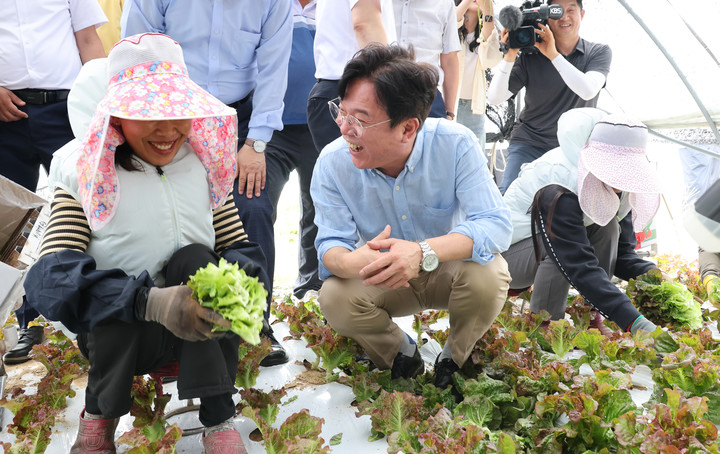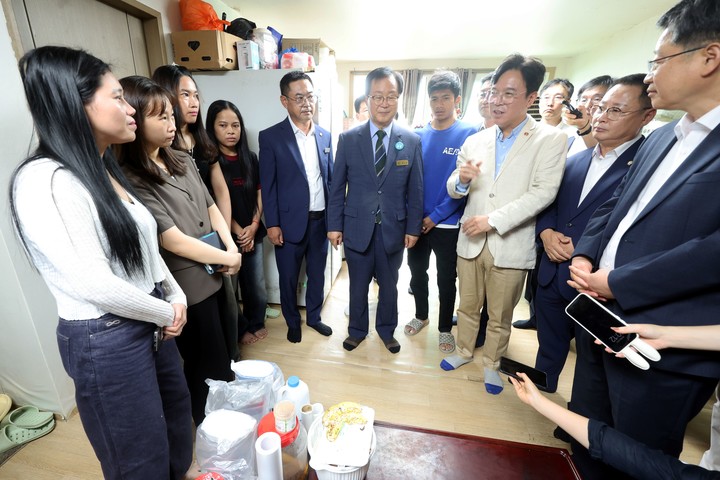Minister Kim Young-hoon Stresses Urgent Need to Eliminate Discrimination in the Workplace
Government, National Assembly, and Local Authorities Join Forces to Improve Rights and Living Conditions for Migrant Laborers

On August 8, the Ministry of Employment and Labor announced that Minister Kim Young-hoon, together with Ahn Ho-young, Chairman of the National Assembly’s Environment and Labor Committee, and Yoo Hee-tae, Mayor of Wanju County, visited a farm employing foreign workers in Wanju County, North Jeolla Province.
During the visit, the delegation conducted an on-site inspection of the labor environment for foreign workers, recognizing the persistent discrimination and human rights violations that occur, particularly during the sweltering summer months in rural areas.
The delegation inspected the accommodation facilities for migrant workers, checking basics such as air conditioning and heating. They encouraged business owners who had renovated existing houses to provide a more comfortable living environment for their staff.
At a lettuce farm, compliance with five key safety rules to prevent heat-related illnesses was reviewed. Authorities also requested that employers provide at least 20 minutes of rest every two hours, along with access to cool drinking water for their workers.
A subsequent roundtable gave voice to the real-life work and living experiences of migrant workers, as well as to challenges faced by employers in the agricultural sector.
During the event, safety supplies and items to prevent heat-related illnesses were distributed directly to workers. The government, the National Assembly, and local governments all reaffirmed their dedication to policies that respect workers’ rights.
Minister Kim Young-hoon emphasized the importance of respecting the human and labor rights of all workers. He introduced a campaign encouraging the use of foreign workers’ names, noting that the government had begun distributing name tags in both the workers’ native languages and Korean, to be attached to their work uniforms.

Going forward, the Ministry of Employment and Labor plans to collaborate with the Human Resources Development Service of Korea to provide Korean-language name tags to all employees under the Employment Permit System and expand human rights and industrial safety education for employers.
There are also intentions to broaden the campaign in partnership with local governments and human rights organizations, and to promote a shift in public perception about foreign workers through a variety of administrative supports.
With cases of rights violations against migrant laborers continuing to surface, an intensive reporting period for labor rights violations will run from the 11th to the 29th of August. Beginning August 20, every Wednesday will be designated as “Foreign Worker Labor Rights Report and Consultation Day,” with employment centers staffed by labor attorneys, labor inspectors, and interpreters to offer one-stop counseling services.
During this focus period, the Ministry of Employment and Labor will strengthen the use of its reporting system for migrant workers’ labor rights via online platforms, social networks, brochures, and in cooperation with local governments. Proactive workplace inspections, especially in rural areas with large numbers of foreign employees, will be carried out based on analysis of past case studies.
Minister Kim Young-hoon stated, “The joint efforts of the government, the National Assembly, and local governments to directly address the human rights, safety, and housing issues of foreign workers in rural areas are very meaningful. All forms of human rights violations must be eradicated, and labor rights without discrimination must be assured.”
He further highlighted the seriousness of the living conditions faced by migrant workers in rural and fishing communities, adding, “Improving residential environments is a fundamental human rights issue, and we are committed to formulating comprehensive measures.”
Note “This article was translated from the original Korean version using AI assistance, and subsequently edited by a native-speaking journalist.”
Photo=Yonhap News Agency
추천 뉴스
- 1 Cheon Ho-jin Returns as the Nation’s Father in Sparkling Days, Premiering Tonight The new KBS2 weekend drama Sparkling Days premieres tonight, marking the much-anticipated return of “the nation’s father” Cheon Ho-jin. This project stands out not simply for being a new drama, but for reuniting director Kim Hyung-seok and writer So Hyun-kyung, the duo behind the record-setting My G
- 2 KBO League Sets New Record by Reaching 9 Million Spectators in Just 528 Games The 2025 professional baseball season in South Korea has set a new benchmark, as the KBO League reached a cumulative 9 million spectators after just 528 games—the fastest this achievement has ever been recorded.According to the Korea Baseball Organization (KBO) on August 8, a total of 87,523 fans at
- 3 Jeonbuk Province and Sohn Kee-chung Memorial Foundation Ally to Seek 2036 Jeonju Summer Olympics Jeonbuk Special Self-Governing Province and the Sohn Kee-chung Memorial Foundation have joined forces in a bid to host the 2036 Jeonju Summer Olympics.On August 8, the two organizations signed a memorandum of understanding concerning collaborative efforts to attract the Olympics, at Sohn Kee-chung A
- 4 LA Dodgers’ Kim Hye-sung and Tommy Hyun-soo Edman Welcome Son Heung-min to Los Angeles with Heartfelt Video Message Kim Hye-sung and Tommy Hyun-soo Edman of the Los Angeles Dodgers have warmly welcomed Son Heung-min, who recently signed with Los Angeles FC, with a special video message.On August 8, the Los Angeles Dodgers released a video on their official social media channels congratulating Son Heung-min on his
- 5 Jeon Soyeon of (G)I-DLE Stuns in Bra Top on LA Streets, Blending Hip and Sexy Vibes Jeon Soyeon, member of the girl group (G)I-DLE, made headlines for her striking fashion on the streets of Los Angeles, effortlessly blending a hip street style with bold sensuality.On August 8, Jeon Soyeon shared a series of photos on her social media account, simply captioned "Again," offering fans
- 6 CORTIS: A Blessing or a Challenge? The Future of Big Hit's First Boy Group in Six Years On August 18, a new force is set to enter the K-pop scene, burdened yet honored by one of the industry’s most heavyweight titles. Big Hit Music—the label known as a powerhouse of boy groups—will unveil CORTIS, its first new boy group in six years since Tomorrow X Together (TXT). As the agency behind
- 7 Korea’s Leading Amateur Golfers Gather for the 32nd Song-Am Cup in Daegu The 32nd Song-Am Cup Amateur Golf Championship is set to tee off on August 19 at Daegu Country Club, bringing together the largest group of amateur golfers in Korea this year. This year’s event will see over 180 promising junior golfers from across the nation, including seven national team members a
- 8 Oh Seung-hwan Bids Farewell to SSG and Incheon Fans, Marking Start of Retirement Tour Oh Seung-hwan of the Samsung Lions formally marked the beginning of his retirement tour by bidding farewell to SSG Landers fans and players at SSG Landers Field in Incheon on August 7. Prior to the away game against the SSG Landers, the celebrated closer took to the field to personally thank the fan
- 9 Blockchain Technology Set to Transform Everyday Life in Korea, From Ticket Scalping Prevention to Virtual Hospitals The Ministry of Science and ICT, together with the Korea Internet & Security Agency, is launching a large-scale initiative to spread blockchain technology throughout everyday life and across industrial sectors.In an effort to identify innovative new blockchain services this year, the two organizatio
- 10 Jurado Dominates With Eight-Inning Gem as Samsung Secures 10th Win Over SSG The Samsung Lions clinched their 10th win of the season by defeating the SSG Landers 6-1 during the 2025 Shinhan SOL Bank KBO League away game held at SSG Landers Field in Incheon on August 7.The game’s standout player was starter Ariel Jurado, who took the mound for Samsung and delivered a commandi
